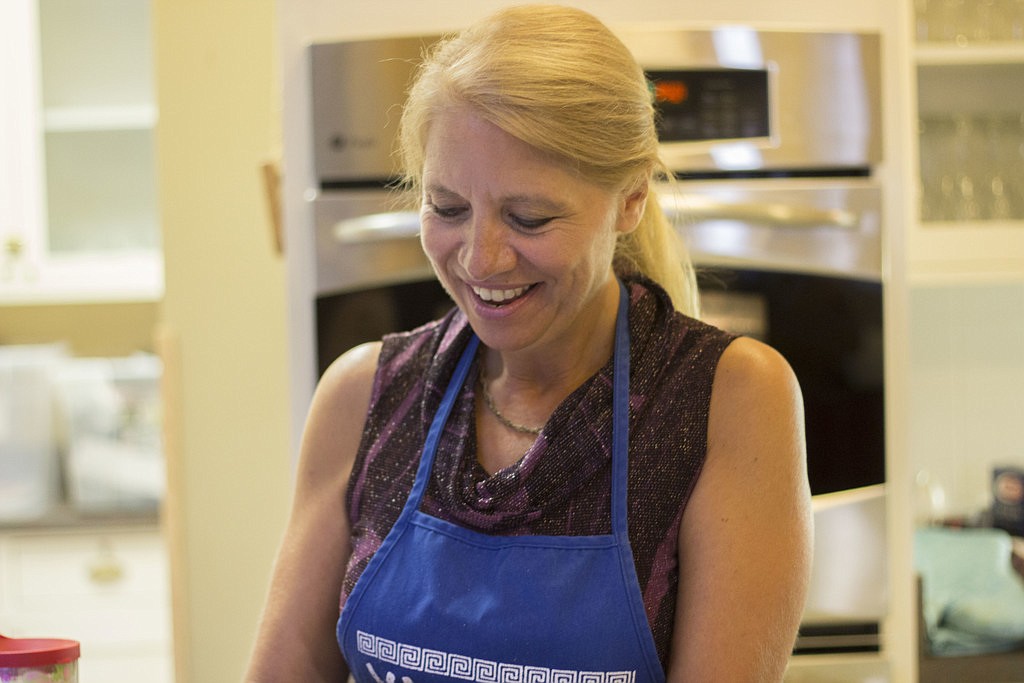- November 29, 2024
-
-
Loading

Loading

Get to know Ormond Beach’s infamous Greek cuisine expert
Elaine Pitenis is smart by many definitions of the word. A graduate of Harvard University, she worked as microbiologist studying cancer research for many years before she got married and raised four children. Now, she’s created a business teaching Greek cooking classes where she works once a month, and spends the rest of her time painting her nails and walking on the beach. Elaine Pitenis is smart by many definitions.
My Big Fat Greek Cooking Class has been held monthly at The Casements since 2004, where Pitenis has been educating Ormond Beach in the art of traditional Greek cooking infused with there own innovative methods. The popularity of the class can be judged by the fact that it is almost always full.
The Observer visited the Ormond Beach resident during one of her recent classes, and discussed exactly how one could mimic her smart choices.
When were you first introduced to Greek cooking?
I was first introduced to Greek cooking by my mother who was a home economics teacher in Cambridge, Massachusetts. Both my grandmothers immigrated to America and brought their Greek recipes with them, most dating back hundreds of years and based on the Mediterranean diet. They taught me to cook as well as how to speak Greek.
What was it like living in Greece?
My husband and I took a sabbatical and moved to Greece in 1999 with our four young children and spent our year traveling in Europe. We loved traveling to France and throughout Greece and the Greek Islands. Our children were exposed to many wonderful experiences and delicious Greek foods. While in Greece, I learned many Greek cooking techniques from several acclaimed chefs from Athens, Corinth, Kastoria, and the islands of Samos, and Salamina.
How did you come up with the idea for your cooking classes?
In 2004, I was approached by my neighbor Joann Fischer to teach her and her friends Greek cooking. I had so much fun teaching that the idea came to me to take it to the next level and formalize it by offering Greek cooking classes at The Casements. Over the years, I have improved my grandmothers’ recipes by reducing much of the fat and calories, and as a result the foods have the same taste. I have had the privilege of teaching hundreds of students Greek cooking at The Casements, and each class is a joy.
What separates Greek from other foods?
Greek food is healthier since it uses whole grains, nuts, lean meats, fresh fish, fresh fruits and vegetables, yogurt, honey, garlic, olive oil, red wine, while limiting red meats. We all know this as the Mediterranean diet, and most people who live in that region of the world have been known to live long into their nineties. Greeks also love to use spices such as oregano and cinnamon, which have been known to have antimicrobial properties and also high in antioxidants.
What was the transition like going from microbiology to cooking? Are they related in anyway?
As a Harvard-trained research scientist at both Boston’s Children’s Hospital and Dana-Farber Cancer Institute, I worked for years in research laboratories solving tough gene therapy problems, as well as working with bone marrow transplant patients. From a sterility and cleanliness point of view, they are related. I have to keep my kitchen as clean as my laboratory. My medical experience has helped me to better understand the methods, materials, and ingredients that we use to create our meals by minimizing the amount of fat content in each recipe making them very heart-healthy. I simply exchanged my laboratory for a state-of-the-art kitchen. When a discovery is made in science, often it is written in a journal publication. Similarly, my recipes will soon be published into my first cookbook.
What’s one common misconception about Greek food or cooking?
Greeks really don’t eat that much red meat, like steak or lamb. Lamb is traditionally served at special occasions like Easter. Most traditional dishes in Greek cuisine are vegetarian and have a wonderful fresh aroma.
How do you spend your down time?
I love to cook and bake for my family, but when I’m not in the kitchen, I love to travel to Boston several times a year to visit my 90-year-old mother Connie, who follows the Mediterranean diet. I also take some time to visit my four children: my oldest daughter Angela, is a Ph.D. student in mechanical engineering at the University of Florida who will be graduating next year. My other daughter Connie, lives in Manchester, New Hampshire and works as a human factors engineer for DEKA Research and is a 2013 graduate of Embry-Riddle Aeronautical University. My youngest daughter Victoria, studies at the nursing program at Daytona State College, and my son Jimmy, will be studying business at Embry-Riddle in the fall and playing on their golf team. I love teaching Sunday school at St. Demetrios Greek Orthodox Church in Daytona Beach and helping them with the food preparation for their annual Greek Festival that takes place each November. I enjoy updating my website www.mybigfatgreekcookingclass.com. My husband, Jim, and I also love to travel and explore the wonderful beaches that Florida has to offer.
What advice do you have for people who have a career like yours?
If you can find a career that makes you happy, you will never feel like you’ve worked a day in your life.
Visit www.mybigfatgreekcookingclass.com for more information.